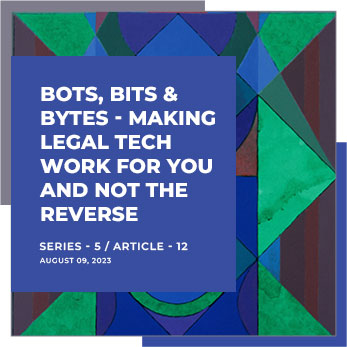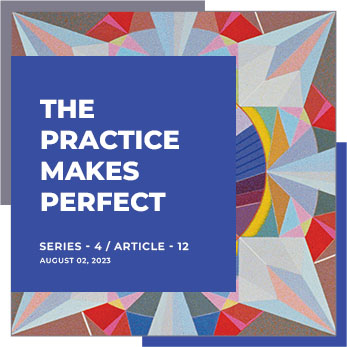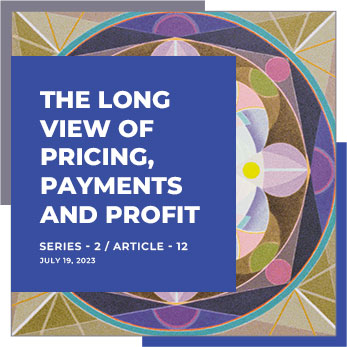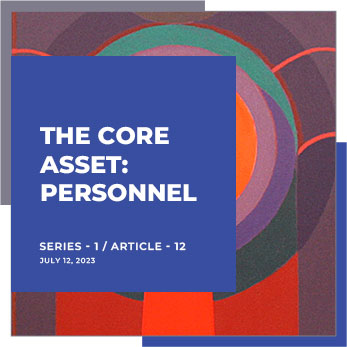“Lawyers also hire other lawyers when they confront professional quandaries such as client perjury or fraud and other confidentiality concerns, conflicts of interest, and attorney-client disputes. Whether in matters that may give rise to substantial financial exposure or otherwise, the outside counsel they select may be another lawyer in the field or a distinguished ethicist from whom a formal opinion is sought.”
There is an old adage that says, ‘a lawyer who takes his own case has a fool for a client’. But what about when he takes his whole firm as his client….?
After all, someone has to represent the firm when the firm itself is a party to the litigation, and there might very well be both ethical and logistical issues with hiring another outside firm—especially if that firm has been on the other side in previous lawsuits. Not an easy predicament. Yet, lawyers do represent lawyers, and the firm’s own lawyers might be the chosen ones. Let’s take a look at what the issues are surrounding this likely difficult situation.
Lawyers’ Lawyers
Interestingly, there are actually law firms that specialize in representing other firms and individual lawyers. That’s not so surprising considering the fact that law firms can make mistakes or simply get caught up in litigation like any other ‘person’ in society. In addition, clients are not particularly averse to suing law firms, and such action can even be a ploy to fend off the collection of lawyers’ fees.
So, what do law firms get sued for? Typically, the cases revolve around claims brought by clients who are alleging malpractice, breach of fiduciary duty, billing disputes, and related claims for fraud or other torts which can arise from client litigation or from a transactional engagement. A law firm might also need representation to fight a disqualification motion.
Hitting Back at SLAPP
SLAPP lawsuits (short for Strategic Lawsuits Against Public Participation) are intended to intimidate and silence public criticism. Such lawsuits are generally baseless and are filed to essentially stop a party from exercising their First Amendment rights on a topic of public interest. Although often filed against journalists to halt the publication of a story, lawyers are also quite often the targets of SLAPP lawsuits. To prevent such abuse of the courts, anti-SLAPP statutes have been created, and a law firm that finds itself the subject of a SLAPP lawsuit will need legal representation to oppose the action.
However, conversely, there are law firms that make use of anti-SLAPP statutes only to have such defenses thrown out, and the key here is whether or not the anti-SLAPP filing is related to protected activity. Successful anti-SLAPP motions can stop discovery, result in an automatic right to appeal, and in the award of attorney’s fees. Clearly, an ethics issue can arise if a lawyer files an anti-SLAPP motion against a client to whom the firm may very well owe obligations of confidentiality, which outside counsel would not be bound by.
Dissolutions and Partner Disputes
A particularly tricky situation arises when a law firm dissolves non-amicably or hostile disputes arise between the partners. Each partner owes a fiduciary duty to the partnership, and acting against the partnership can bring the attorney into conflict, which necessarily harms his or her client firm. Litigation involving dissolution and other partnership disputes usually involves an assignment of value to the partnership, and conflicting measurements of value can, of course, put the lawyer pressing the firm’s case in a conflict-of-interest situation.
Rule 1.7: Conflict of Interest
ABA Model Rule 1.7 provides that a lawyer shall not represent a client if the representation involves a concurrent conflict of interest. A concurrent conflict of interest exists if (1) the representation of one client will be directly adverse to another client; or (2) there is a significant risk that the representation of one or more clients will be materially limited by the lawyer’s responsibilities to another client, a former client or a third person or by a personal interest of the lawyer.
In cases where the firm is being sued by a client, the opportunity for conflict is clear if a lawyer from the firm defends the firm. But even in a lawsuit brought by a non-client, the firm partner’s own interests might dictate if and by what amount the case gets settled where he or she represents their own firm. Historically, when the ABA Opinion 97-406 (1997), a minority of the panel held that lawyer representation of a firm should be disclosed even if Rule 1.7 did not require it.
In a concurrence, Lawrence Fox said that he would have gone farther than the majority and opined that a lawyer may have to disclose the “lawyer-lawyer” representation to her client even though Rule 1.7 did not require it. He cited Rule 1.4’s requirement that the lawyer keep clients informed of important events. He ventured that many clients would feel they had a right to know of the other representation under Rule 1.4 regardless of the effect of Rule 1.7.
Disciplinary Matters
Legal experts are pretty much unanimous in recommending that a lawyer facing possible disbarment or license suspension be represented by someone outside of their firm. The stakes are incredibly high—possibly career-ending for your associate or partner—and the relationship too personal. Because of the friendship—even kinship—the element of emotional detachment will be lacking, and the level of anxiety and stress within the firm will be unhealthy for all concerned. Although not directly an ethics quandary, this situation nevertheless raises a very practical issue as to objectivity and business conflict for the firm.
What’s the best practice? Follow the old adage and never take yourself or your own firm as a client.
Executive Summary
The Issue
What are the ethical concerns when representing your own firm in litigation?
The Gravamen
Conflicts of interest can arise vis-à-vis the client who is suing the firm, the possible personal interest of the lawyer in the outcome of the litigation, or as concerns valuation of the firm itself.
The Path Forward
Law firm representation is a specialty that is practiced throughout the U.S., and lawyers and law firms should avail themselves of this practice specialty when in need of representation.
Action Items
Canon of Ethics:
Before considering representing your own firm in any litigation, examine carefully what the ramifications might be in terms of your state’s rules of professional responsibility.
Anti-SLAPP Limitations:
If you or your firm are facing what you consider to be a SLAPP action, be certain that your own anti-SLAPP response falls within the protections of your state’s anti-SLAPP legislation.
ABA Rule 1.4:
Under Rule 1.4, a lawyer may have to disclose the ‘lawyer-lawyer’ representation to the client even if Rule 1.7 did not require it because Rule 1.4 requires a lawyer to keep the client informed of important events.
One Area Totally Off-limits:
Regardless of whether a lawyer feels that he or she can avoid the ethical issues surrounding the representation of one’s own firm, there is a consensus that a lawyer should never represent a firm lawyer in matters of attorney discipline.
Further Readings
- https://www.forbes.com/sites/jayadkisson/2022/09/12/anti-slapp-laws-and-actions-by-or-against-attorneys-personally/?sh=14c003f56f26
- https://www.freivogelonconflicts.com/lawyersrepresentinglawyers.html
- https://www.law.uh.edu/libraries/ethics/trpc/1.06.html
- https://www.hinshawlaw.com/services-lawyers-for-the-profession.html
- https://www.law.com/2022/12/15/the-cure-really-has-become-the-disease-why-lawyers-love-anti-slapp-defenses/?slreturn=20230612145932







